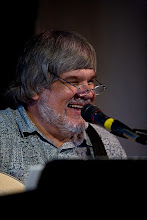One of the characters the Beatles encounter on this trip to Hamburg is a middle aged woman named Rosa, familiarly called "Mutti" (say Moo-tee), who kept the public restrooms at the Top Ten clean and orderly for tips. She also acted somewhat like a house mother to the young men in the bands. (Mutti is a German pet name meaning "mother", something like the American "mommy".) One of the little favors that Mutti does for the boys is to provide them with Preludin pills. "Prellies", in that more innocent age, were just harmless diet pills with the happy side effect of keeping users awake all hours of the night. Just what the doctor ordered (lol) for healthy young lads who were required to "mach schau" with rhythm and blues into the early hours every night when their circadian rhythms would have been insistently whispering to them it is time to meet with the sandman.
 |
| Preludin, anyone? Paul and his Rosetti guitar. Photo by Jurgen Vollmer |





